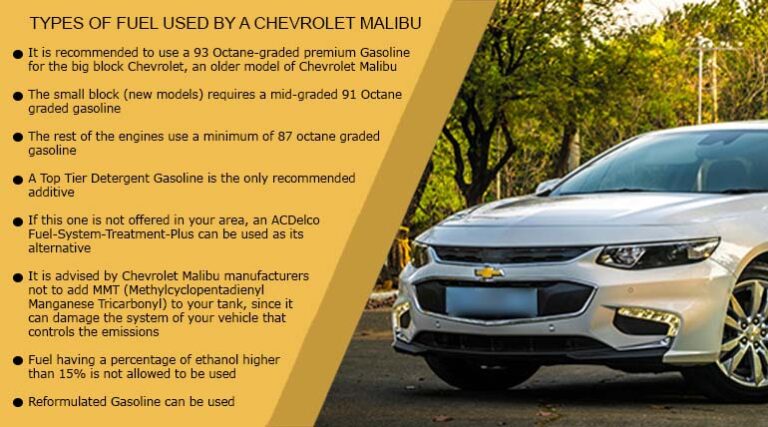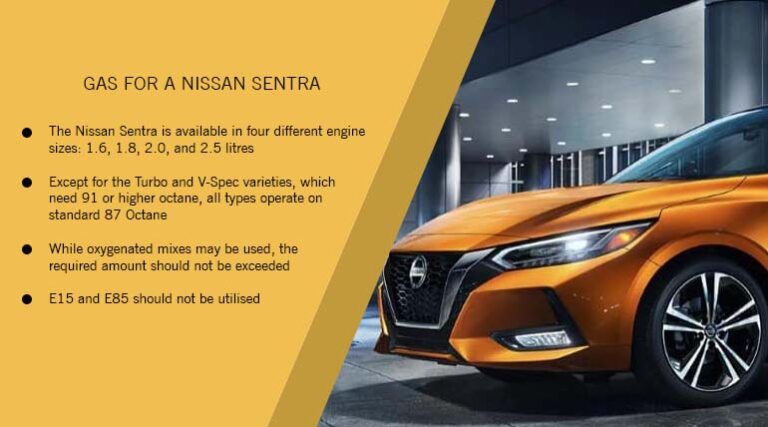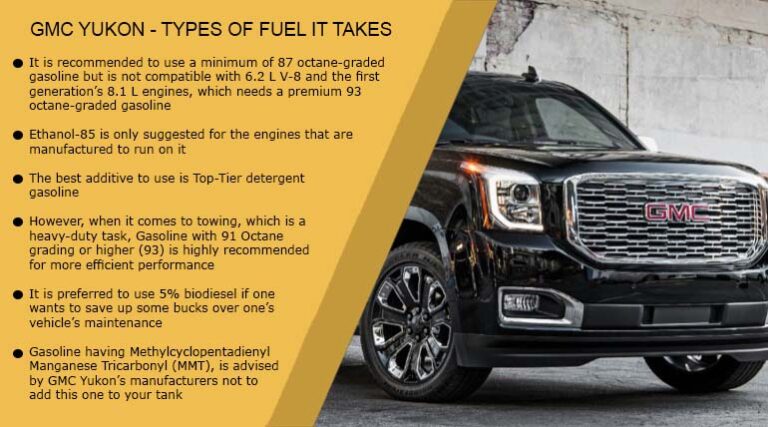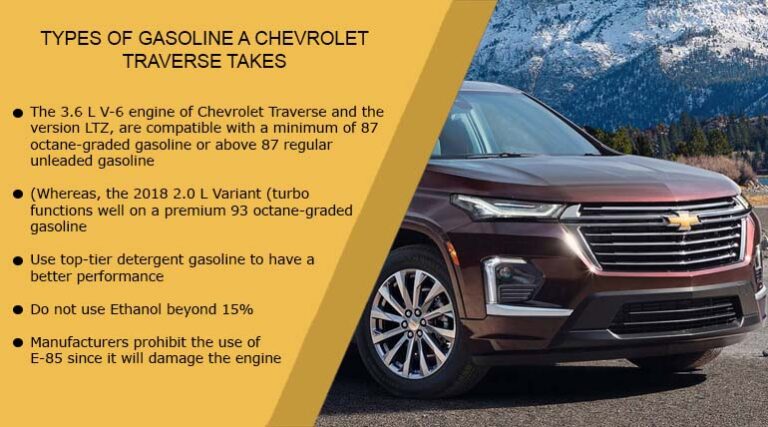Types of Fuel A Dodge Durango Takes – Everything You Must Know!
This article is going to sum-up everything about the exact types of fuel a Dodge Durango uses. But before we move into the details, let’s first get into a brief introduction to the Dodge Durango. Or if you are in mix of buying a dodge car then I would recommend you checking out the fuel types of Dodge Journey as well before making you decision.
The Dodge Durango, a beautiful luxurious SUV, was first produced in 1997 by the re-known automobile company “Dodge,” with 1998 as its first year the model in the market. It is currently in its 3 generations and is a mid-sized utility automobile. It unveiled its first generation in an automobile show in North America back in 1997.
A Brief Overview!
Let’s go through a brief overview of this article regarding the correct types of fuel for a Dodge Durango before jumping into the detailed description;
To summarize, use a minimum of 87 octane-graded gasoline (Regular, unleaded) for the 3.5 L, 3.6 L, and 4.7 L engines offered throughout 1997 to current most models. Use a minimum of 87 to 89 octane-graded gasoline (Regular, unleaded) for the engines 5.7 L V-8 and 5.9 L V-8. Utilize gasoline with 89 Octane-rating for optimum functionality. Gasoline with a 91 Octane-rating is a premium one. Use 91 Octane gasoline for the 6.2 L and 6.4 L engines offered by Dodge Durango (SRTs).
Types of Fuel Dodge Durango Takes (Explained)
Below are detailed answers to all of your queries, from which type of fuel Dodge Durango uses to the ones not. By referring Dodge Durango’s owner’s manual, all the information regarding its fuel types is extracted here in this article for you. Read On!
Related Article: Gasoline Types A Dodge Challenger Requires
Fuel Type Depending on Dodge Durango’s Engine
The correct types of fuel is based on your Dodge Durango’s engine. Given below are details, regarding the engines offered by the Dodge Durango’s model years and the compatible type of fuel, according to its specific generation, models, and type of engine.
Model Year Wise Engines – 1997 to Present
Following are the engines the total 3 generations of the Dodge Durango offers;
Dodge Durango – The Model Year 1997 to 2003
Following are the engines offered between model years 1997 to 2003;
- Durango 4.7
- Dodge Durango 5.9
Dodge Durango – The Model Year 2004 to 2009
Following are the engines offered between model years 2004 to 2009;
- 3.7 L V-6 (4 AT)
- 4.7 L V-8 (5 AT)
- 5.7 L V-8 (5 AT)
Dodge Durango – The Model Year 2013 to 2020
Following are the engines offered between model years 2013 to 2020;
- 3.6 L V-6 (8 AT AWD)
- 3.7 L V-6 (4 AT)
- 3.6 L V-6 (8 AT RWD)
- 5.7 L V-8 (5 AT AWD)
- 5.7 L V-8 (5 AT RWD)
Dodge Durango – Model Year 2020 to Present
Following are the engines whose model years 2020 to present offer;
- 3.5 L V-6 (8 AT) single exhaust
- 3.5 L V-6 (8 AT) double exhaust
- 5.7 L Hemi V-8 (8 AT)
Regular (Unleaded) Gasoline
According to the Dodge Durango owner’s manual, it is suggested to utilize not less than 87 octane-graded (Regular, unleaded) for the 3.5 L, 3.6 L, and 4.7 L engines being offered throughout 1997 to current most models.
It is recommended to use a minimum of 87 to 89 octane-graded gasoline (Regular, unleaded) for the engines 5.7 L V-8 and 5.9 L V-8. According to the owner’s manual, Gasoline with 89 Octane-rating has been preferred for optimum functionality and is highly recommended for the regular Dodge Durango gasoline engines.
Gasoline, with a premium 91 octane rating or higher, is not recommended for such models of Dodge Durango since these are regular and need to be designed to function better on it. Hence if used, there will be seen as no benefits.

Premium Gasoline
A 91 Octane-rated gasoline or higher is termed a “premium.” Such premium octane types of gasoline are perfect for heavy-duty tasks such as towing or racing. It is recommended by the manufacturers of the Durango to utilize this premium gasoline in the engines such as 6.2 L and 6.4 L engines offered by Dodge Durango (SRTs) because these are specifically designed to function on a premium one.
Which Varieties of Fuel Should Be Used and Are Compatible with Dodge Durango?
Today, we have various non-conventional automobile fuel options. From additives to Reformulated Fuel (RFG). But are they even compatible with Durango’s engines?
We will attempt to address this question quickly in the next segment of this article, so Hang On!
Reformulated Gasoline Fuel (RFG)
For cleaner burning, and with a nature-friendly impact, use Reformulated Gasoline (RFG), which causes decreased smog, and less toxic pollutants than regular gasoline, having no hostile consequences.
It is allowed to be used by Dodge for its Dodge Durango whenever it is available since it has also been compulsory for almost nineteen locations in the USA to use a less toxic fuel to protect air quality.
Gasoline comprising Methylcyclopentadienyl Manganese Tricarbonyl (MMT)
It is suggested by the manufacturers of the Dodge Durango not to add any additive based on Manganese since it can damage the system of your vehicle that controls the emissions.
Gasoline comprising Methylcyclopentadienyl Manganese Tricarbonyl, abbreviated as MMT, was used to improve the octane of fuel with poor quality. It was also used to seize the knocking noise produced by engines back then. If it is used in vehicles that are not recommended, it can lead to much harm.
E-85/E15 or Gasoline/Oxygenated Blends
Oxygenation blends can be used in your Dodge Durango, but with some limitations. Dodge Durango’s model years manufactured between 2004 to 2009 are a flex-fuel, making them Ethanol-85 (E-85) compatible. For the Durango models made post-2009, only 10 percent of Ethanol was allowed to be used, which was increased to 15 % after 2013 till the current models.
If your Dodge Durango is not flex-fuel, it is recommended not to consume gasoline with more than 10 to 15 percent of Ethanol since it could lead to severe engine damage.
Gas with Added Materials
Additives prohibited by Dodge Durango include solvents, methanol, silicon, metal-based ones, kerosene, additives based on metals, and lead based on fuels.
Consequences of Liquid Propane (LP) and Compressed Natural Gas (CNG) Modifications
It is against the warranty of the Dodge Durango to run your vehicle on LP or CNG by modifying it. Not just engines but the emission and fuel systems can also get harmed by applying these modifications.
Suggested Fuel and Additives for Dodge Durango
A top-tier (detergent) gas is greatly commended for Dodge Durango, which keeps the engines clean and away from debris. It is suggested that the Dodge Durango utilize a gas mixed with a large concentration of agents used for cleaning. The only recommended additives other than cleaning agents are stability and corrosion additives. These are readily available with your nearest top-tier retailers.
Most Commonly Asked Questions!
“My Engine Knocks Afterwards Refilling”- What Does It Indicate?
If lower octane-rated gasoline is used in your Dodge Durango, it degrades the performance and economy of the engine. Gasoline will burn prematurely if a lower octane gas is put in an engine with higher compression, causing an unsmooth burn and engine knock. Hence, using the correct gasoline fuel with the proper octane grading is crucial.
If a fainted-knocking sound is heard from the engine, it indicates no danger. But if a loud knocking sound is heard, it is due to using lower quality and lower octane-rated gasoline.
How Can I Eliminate “Knocking Noise”?
To reduce knocking-like noise in Dodge Durango, fill up your tank with a recommended minimum of 87 to 89 Octane-graded gasoline. Or a premium 91-octane gasoline or greater.
Can All the Models of Dodge Durango Consume RFGs as Fuel?
You must be pondering if all the models of Dodge Durango are suitable for using Reformulation Gasoline Fuel? So the answer is YES! Recommended is to consume RFGs whenever available since it has also been compulsory for almost nineteen states and regions in the United States of America to use a less toxic fuel to protect air quality.
What is the Size of the Fuel Tank of a Dodge Durango?
Dodge Durango’s model, made between 1997 and 2009, offers engines such as 3.7 L, 4.7 L, 5.7 L, and 5.9 L with a fuel tank of 102 L or 27 Gallons. Whereas the ones manufactured after 2013 have a fuel tank capacity of 93 L or 24.6 Gallons.
DO YOU KNOW!
There are some shocking facts about the low fuel-light on all the dodges and if you want to know, click here.
Worth Using the Correct Type of Fuel for Dodge Durango
Now the query arises, why is it important to know about the correct type of fuel for your Dodge Durango? The response to this is simple; to guard your engine against damage and accidents of fire and to keep your warranty away from being void.
How to Locate a Flex-Fuel Vehicle?
Following are the ways to locate a flex-fuel engine in your vehicle.
- A yellow bezel surrounding the inlet of the fuel tank indicates that your car is flex-fuel. If you cannot find it there, you can check out the door of your fuel tank as well.
- If your Dodge Durango has a Flex-Fuel emblem as well as a yellow gas tank cap, it signifies it is E-85 compliant and safe to utilize E-85 Fuel (model years 2004 to 2009)
- But keep in mind to burn all the flex-fuel when you decide to run your vehicle on regular gas, and don’t add lesser than 3 gallons of flex-fuel in your tank at a time while refilling.
DODGE DURANGO USER REVIEWS – Regular, Mid-Grade, or Premium Gasoline?
After consulting numerous forums regarding types of fuel Dodge Durango uses, conclusion is, regular, unleaded gasoline with 87 Octane-rating proves to work well. While the ones using the gasoline with 89 octanes or premium 91 or higher Octane rating has much better results. Also helped in reducing the knocking noise from their engines.
Dodge Durango drivers declare that going on a gas lesser than 87-octane or sometimes 89 abuses the engine and its performance.
Many drivers also stated that they didn’t see any difference even with the 91 Octane till their engines tuned for the 91 octane-graded gasoline. Drivers have seen the damage to their engines due to an exceeded amount of Ethanol blended with their gasoline.
Conclusion:
To conclude, Dodge Durango is a beautiful luxurious SUV, was first produced in 1997 by the re-known automobile company “Dodge”. It is currently in its 3 generations and is a mid-sized utility automobile. It unveiled its first generation in an automobile show in North America in 1997.






